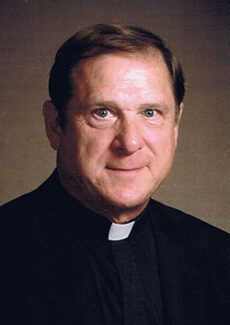Contrast, contradiction, paradox, grace

Father R. Michael Schaab
By Father R. Michael Schaab
Twenty-Second Sunday in Ordinary Time/Aug. 30
Jeremiah 20:7-9; Psalm 63:2,3-4,5-6,8-9; Romans 12:1-2; Matthew 16:21-27
Three words help us understand the readings for this Sunday — contrast, contradiction and paradox.
Contrast means one thing is strikingly different from another. Today’s Gospel stands in contrast to last week’s Gospel, Peter’s profession of faith. In that Gospel Peter says to Jesus, “You are the Christ, the Son of the living God.” In this Gospel Jesus says to Peter, “Get behind me, Satan!” Nothing could be more different than being a person filled with faith on the one hand and being identified with Satan on the other, but that is exactly how Peter is presented. It raises the question for each of us, “How much do I embody this contrast in my life?”
Contradiction means one thing is opposed to another. In the first reading Jeremiah, as a prophet, is a walking contradiction. He has been chosen by God to speak the words of the Lord. As he says, he is compelled to “cry out” the Lord’s message. But being a prophet can be an unrewarding vocation, and Jeremiah is determined to stop irritating the people with his words, so he decides to remain silent. A silent prophet is a contradiction, and the contradiction becomes like a fire burning in his heart. He cannot endure it. He’ll explode if he doesn’t prophesy.
A paradox is a seemingly absurd statement that when explained may be true. In the Gospel Jesus says that to be his disciple one “must deny himself, take up his cross, and follow me,” a reality that may be as unpleasant for us as being a prophet was for Jeremiah. To explain and justify this essential Christian vocation Jesus gives us a classic paradox: “Whoever wishes to save his life will lose it, but whoever loses his life for my sake will find it.” As for many paradoxical statements, the truth of these words will not be fully understood until it is experienced, and Jesus himself will provide that experience in his dying and rising when he finds life in losing life. That paradox is called the Paschal Mystery which we’re all called to share in.
KEYS TO THE KINGDOM
The common thread through Peter’s struggle to fully understand his profession of faith and Jeremiah’s complaining about his life as a prophet is God’s grace. After professing that Jesus is the Son of the living God, Peter was told that this was revealed to him by the heavenly Father. Jeremiah, using a less complementary term, admits that his work was made possible because God duped him. Revelation or duping, it is all God’s grace, and that same grace is available to us today.
Today’s second reading from the Letter to the Romans says the followers of Christ are to be transformed “by the mercies of God.” That’s grace, and it’s important that “mercies” is plural because grace comes into our lives in an infinite number of disguises. It can be in confrontation with Jesus as well as in revelation from the Father as Peter discovered. It can be in duping as well as in a burning in the heart as Jeremiah recognized. This reading reminds us that one of the primary duties of the Christian is to discern, to see and understand the presence of God in our lives.
The common thread through Peter’s struggle to fully understand his profession of faith and Jeremiah’s complaining about his life as a prophet is God’s grace.
But what might be the purpose of contrast, contradiction and paradox as we encounter them throughout the Scriptures? They are all keys to the Kingdom. They are ways in which we open the gates of heaven, be it ever so slight or brief an experience, while we remain here on earth. Or better, they are ways God opens the gates for us. This idea of already getting a share in the glory to come while still struggling with the limitations of our earthly existence is expressed in the phrase “already but not yet.”
Today’s Responsorial Psalm is an expression of this. Psalm 63 speaks of the longing we have for our God, “My soul is thirsting for you, O Lord my God,” while at the same time realizing that our God is right here and right now, “My soul clings fast to you; your right hand upholds me.”
The challenge for Peter was to recognize God present in both confessing faith and blurting out confusion. The challenge for Jeremiah was to recognize God in his prophetic call and in the people’s derision and reproach. The challenge is exactly the same for us. It’s only the circumstances that change.
—
Father R. Michael Schaab is a senior priest of the Diocese of Peoria who gives retreats and days of recollection, and who fills in as presider at parish Masses on weekends. He resides on a hobby farm in Putnam County.





